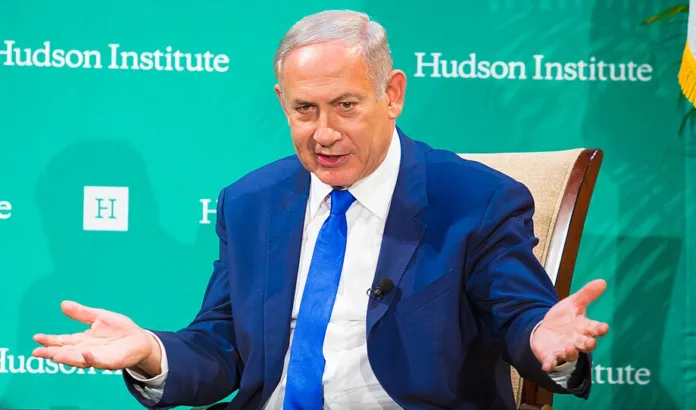Yair Netanyahu’s remarks on Qatar’s role in US universities and ties to terrorism draw a sharp rebuke from Qatari officials, jeopardizing ongoing talks with Hamas
In a provocative statement, Yair Netanyahu, son of Israeli Prime Minister Benjamin Netanyahu, accused Qatar of being a leading state sponsor of terrorism during a recent panel discussion in Miami. His comments came amidst heightened tensions between Israel and Hamas, where Qatar plays a critical role as a mediator. Yair Netanyahu claimed that Qatar is second only to Iran on the list of major state sponsors of terrorism and accused the Gulf state of receiving preferential treatment in Washington and New York.
At the panel, Yair Netanyahu further asserted that Qatar is the primary financial backer of US universities, insinuating that this influence has contributed to the recent anti-Israel protests that have erupted across American campuses. He described these protests as orchestrated by “radical left organizations” and suggested that the protests are a means to destabilize American society. “Israel is just an experiment,” he stated, claiming that the protests serve a larger agenda against the US.
Embed from Getty ImagesIn response to these accusations, a Qatari diplomat expressed concern that such remarks could derail the ongoing negotiations aimed at achieving a ceasefire between Israel and Hamas. The diplomat characterized Yair Netanyahu’s comments as “extremist talking points,” underscoring that they do not contribute positively to the dialogue surrounding the Gaza conflict.
The diplomat also refuted Yair Netanyahu’s claim regarding Qatari donations to US universities, clarifying that these funds primarily cover operational costs for American branch campuses in Qatar, rather than being outright donations. This, the diplomat noted, further illustrates Qatar’s lack of involvement in the anti-Israel protests.
Qatar has been a longstanding mediator in negotiations between Israel and Hamas, hosting the latter’s political leadership since 2012. Despite this role, tensions have persisted. Prime Minister Netanyahu himself has criticized Qatar for not exerting enough pressure on Hamas, warning that Doha’s involvement could be reevaluated if this situation does not change.
Israel’s relationship with Qatar has evolved over the years. While they established trade ties in 1996, relations soured in 2009 during the Gaza war. However, Israel has periodically coordinated with Qatar, allowing the Gulf state to provide substantial financial assistance for humanitarian projects in Gaza. Critics argue that such funding has inadvertently bolstered Hamas’s position, undermining the more moderate Palestinian Authority.
As discussions continue and both sides seek common ground, the implications of Yair Netanyahu’s remarks could complicate an already sensitive situation, potentially impacting future negotiations and the delicate balance of power in the region.
Analysis
Political
Yair Netanyahu’s accusations against Qatar resonate deeply within the political landscape of the Middle East. Qatar’s role as a mediator in the Israel-Hamas negotiations places it at the center of geopolitical dynamics. By labelling Qatar as a state sponsor of terrorism, Yair Netanyahu not only questions its legitimacy as a mediator but also seeks to influence public opinion against Doha’s involvement. This could pressure other nations to reconsider their relationships with Qatar, complicating diplomatic efforts.
Social
The rhetoric used by Yair Netanyahu reflects a growing polarization in discussions about Israel and its neighbours. His comments tap into social narratives that frame conflicts in stark terms of good versus evil. By portraying Qatar as a primary antagonist, he further entrenches divisions within society, potentially mobilizing both supporters and detractors in the ongoing discourse surrounding Israel’s policies and actions.
Racial
While the accusations made by Yair Netanyahu do not explicitly engage with racial issues, the underlying dynamics often intersect with ethnic identities in the region. The portrayal of Qatar as a supporter of terrorism reinforces stereotypes that can exacerbate ethnic tensions and hinder efforts for inclusive dialogue. The framing of the conflict risks alienating diverse groups and undermining solidarity among various stakeholders.
Gender
Although gender issues are not directly addressed in this context, the discourse surrounding conflict often overlooks women’s voices and perspectives. The focus on nationalistic narratives may sideline discussions about how conflict impacts women and families. Engaging with gender dynamics could enrich the conversation and promote more holistic approaches to conflict resolution.
Economic
Qatar’s financial ties to US universities and its humanitarian contributions to Gaza illustrate the complex interplay between economics and geopolitics. Yair Netanyahu’s claims about Qatar’s funding suggest an attempt to portray these economic relationships as inherently nefarious. Understanding the economic motivations behind Qatar’s actions is essential for grasping the broader context of regional stability and the sustainability of peace efforts.
